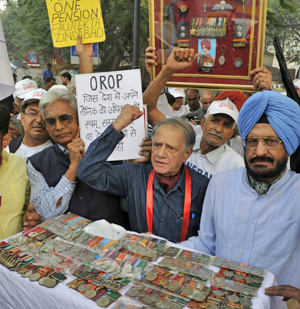New Delhi, Nov 10: Over 2,000 ex-servicemen protesting against the government's "diluted" one-pension-one rank scheme today returned their medals in Delhi, Haryana and Punjab, the organizations spearheading the movement claimed today as they hit back at Defence Minister Manohar Parrikar for his "unlike soldiers behaviour" remark aimed at them.
Colonel (retd) Anil Kaul, spokesman of the protesters in Delhi, said 2,000 ex-servicemen's medals were deposited at the district collector's office.
"The veterans had threatened to leave the medals on the road if we didn't accept it. Hence, we accepted those," District Collector Sanjay Kumar told reporters.
In Chandigarh, Brigadier Kiran Krishan (retd), Convener for North Haryana of Indian Ex-Servicemen Movement (IESM), a constituent of United Front of Ex-Servicemen that had led the nation-wide protest for OROP at Jantar Mantar in Delhi, said that more than 150 war veterans returned over 150 medals which were handed over to the Additional Deputy Commissioner, Panchkula.
Kaul said ex-servicemen from Ambala, Chandigarh, Moga, Jalandhar and Gurdaspur returned their medals today while those from Mumbai, Pune, Vadodara and Bangalore will follow the suit.
"Our people from Mumbai, Pune, Vadodara and Bangalore will return their medals next. By the way, this is just the trailer," he added.
The veterans claimed over 20,000 of them have returned medals since their protest began in 2008 to press for OROP.
Kaul reacted sharply to Parrikar's statement that the war veterans' protest against OROP notification is "unlike that of a soldier" and said the Parrikar's behaviour "too doesn't behove that of a Defence Minister.
Dismissing Parrikar's remarks that the protesters were being "misguided" and that the OROP notification issued on Saturday has been his "achievement", the agitators shot back at the BJP leader asking him to learn English to know meanings of the two words and asked him not to "lie" to his soldiers seeking their due rights.
"He says our behaviour is unlike that of a soldier. But we feel Parrikar's behaviour is unlike that of a Defence Minister. We have been seeking our due to rights for past 149 days. But government has found no time to listen to us.
"Hence, we have been impelled to agitate Mr Parrikar. Your notification is not what we have been talking about. Therefore, we are returning medals," Kaul said.
Kaul said the veterans returning the medals should not be linked to the intelligentsia's "award wapasi" (returning awards).
"Raksha Mantriji, our protest is unlike that of other award-wapasi agitations. We will take back our medals with honour and dignity the day the One Rank One Pension we are talking about is implemented," Major Gen (retd) Satbir Singh, Chairman of Indian Ex-Servicemen Movement (IESM) spearheading the movement, said.
Singh also rejected Parrikar's remark that 95 percent of the veterans' community is satisfied with the notification. "Had that been the case, these people would not have turned up on the roads. He is misguiding on this issue," Singh said pointing towards fellow protesters.
Kaul also refuted claims of differences among the veterans over the issue. At many places in Punjab and Haryana including Panchkula, Ambala, Mohali and Patiala, the veterans held protest and said they were dis-satisfied with the notification issued by the central government last week.
The protesting veterans said that they will observe a 'black Diwali' to protest the Centre's "going back" on its assurances.
As a mark of protest, the medals would be returned to the Centre through the Deputy Commissioners (DC) of the concerned district where the veterans had handed them over.
Brig (Retd) Kiran Krishan said those veterans who returned their medals were from various ranks including Major Generals, Subedar Majors, Captains, Sepoys, among other ranks.
"In our memorandum to the Prime Minister, which we submitted to the ADC, Panchkula, we have expressed our dissatisfaction on issue of notification as it doesn't meet our requirements," he said.
On Parrikar saying the behaviour of ex-servicemen protesting the notification on OROP scheme are "misguided", Krishan said "I don't think anybody is being misguided or misled. This is not just here that we are holding this protest, it is happening at 500 places where the medals were to be returned."
He said "the government must resolve the issue. Even when we were in talks with government, they brought new conditions.."
Asked what will be the future course of action now, he said "a general body will meet soon and devise the new strategy."
The government had on Saturday formally notified the OROP scheme for over 24 lakh ex-servicemen and six lakh war widows in the country.
It has dropped the contentious proposal to exclude ex-servicemen who sought premature retirement from the ambit of OROP. But the armed forces personnel who opt to get discharged on their request would henceforth not get OROP benefits, as per the notification.
Ex-servicemen who have been protesting at Jantar Mantar in New Delhi since June, have rejected the notification.





Comments
Add new comment